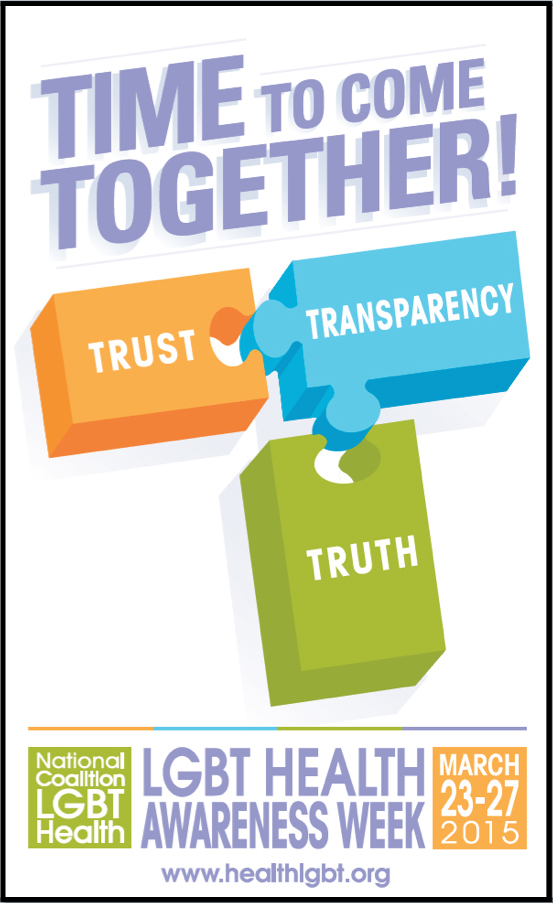In honor of the 13th annual LGBT Health Awareness Week, celebrated March 23-27, 2015, Nurse Practitioner Cindy Leiffer weighs in on the health care community’s transgressions and progress for the LGBT community.
[dropcap letter=”I”]t’s hard to believe that not that long ago, treating lesbian, gay, bisexual and transgender (LGBT) patients was seldom discussed among health care providers. Twenty years ago, when I was studying to become a nurse practitioner, I remember doing both online and library journal searches about lesbian and gay health care: I was disappointed to find only a handful of articles and research studies out there that addressed our health issues.
Of the few articles that were around, most focused on homophobia among health care professionals, lesbian and gay patients’ negative experiences, and high rates of youth suicidality. There was virtually nothing about transgender health.
At the time, I thought back to the early 1980s, when, as a young lesbian patient, I went to a new doctor for a physical. She asked the usual question “Are you sexually active?” When I answered “Yes,” she followed automatically with “What are you using for birth control?”
“Nothing,” I said. “I don’t need birth control. I’m a lesbian.”
Her response made me very uncomfortable. She literally sucked in her breath in a gasp and abruptly said, “Well, I don’t see why that’s any of my business.”
I wasn’t a health care provider at that time, and a medical career wasn’t even on my radar screen. Thirty years later, after 18 years of providing primary care, I can’t imagine making a patient feel uncomfortable or embarrassed for revealing anything personal about his or her life — and yes, your sexuality is my business if you choose to share it with me.
 Sadly, for decades, denial of services, hostile responses and downright rude comments when a patient shared his or her sexual orientation were fairly common for many LGBT people who sought medical care. Although there’s been progress, debunking the many myths that exist about caring for LGBT communities among health professionals remains a barrier toward creating an equal and safe health environment.
Sadly, for decades, denial of services, hostile responses and downright rude comments when a patient shared his or her sexual orientation were fairly common for many LGBT people who sought medical care. Although there’s been progress, debunking the many myths that exist about caring for LGBT communities among health professionals remains a barrier toward creating an equal and safe health environment.
There are many places where LGBT patients, particularly trans patients, are still treated poorly. This is unacceptable, and the law and ethics will be behind us on this, even though human nature can lag behind. In places where we have gained respect and acceptance, it’s now time to educate health care providers and those of us who have been disenfranchised from the health care system about our health care needs.
Few outside of LGBT communities are aware of the various health disparities that exist within our communities. For example, there continues to be a high suicide rate in the LGBT community, particularly among youth. Studies also indicate that nearly two-thirds of those in the transgender community have attempted suicide at some point.
Other examples of disparities are that lesbians are theorized to be at higher risk for breast cancer, possibly due to higher rates of smoking and obesity, less likelihood of having children, and less likelihood of accessing preventive health care. Lesbians are also the only demographic group with an increased rate of smoking as they get older. And lesbian women, like all females, need to be routinely screened for HPV and cervical cancer, but there are still many patients, as well as providers, who do not realize that lesbians are at risk. Also, some gay men have a higher risk of HPV and anal cancer.
In the case of transgender patients, many have very specific needs that may require the care of knowledgeable primary care providers or specialists, such as endocrinologists, for proper hormone treatment. However, due to past negative encounters with health care providers, fear of being treated poorly, a lack of providers who know about transgender health care, or lack of health insurance that will cover their needed services, many transgender patients are not comfortable seeking care from the proper channels.
Some transgender people instead resort to treating themselves with hormones they acquire on the street or via the Internet. I’ve known both patients and friends who have done this because they either couldn’t afford to go to health care providers or were afraid to. Without access to medical care, they were unable to have the lab work and other monitoring recommended for safe hormone use.
Educating providers about LGBT health issues and the various sensitivities involved is a critical first step. We need safer health care environments where LGBT communities feel comfortable going to a health care provider. Medical history questions need to be tailored in such a way that they are inclusive of lifestyle changes and sensitive to transgender association (e.g., preferred name/preferred pronoun).
As health care providers, we have a responsibility to help patients understand that there are safe and non-hostile environments where they can openly speak about their health care needs. Similarly, health care providers need to continue receiving sensitivity training so that they can ask the proper questions about patients’ medical history and thereby have a clear grasp on what is going on in their patients’ lives.
As LGBT patients become more visible and open, and as studies increasingly show the disparities in health care for this largely under-served population, there has been increased interest in this topic. On a national level, the groundbreaking March 2011 Institute of Medicine report The Health of Lesbian, Gay, Bisexual and Transgender People: Building a Foundation for Better Understandinghighlighted many of the specific health care needs of LGBT patients.
The authors also call on the National Institutes of Health (NIH) to include sexual orientation and gender identity questions in federally funded studies. The Joint Commission, a nonprofit organization that accredits more than 20,000 health care organizations and is often a requirement for state licensure and reimbursements, now requires hospitals to include LGBT status in their non-discrimination policies.
For the first time, we have genuine buy-in for LGBT-targeted research and know substantially more about LGBT health than we did two decades ago. The NIH initiative will yield more important data in the coming decades and help us overcome the inequality in health care. With attention on the topic and mandates to provide culturally competent care, health care organizations and schools will likely place a greater need for more qualified experts on LGBT health to take leadership roles — proving the importance of training and education at all levels to provide equal, quality care.
 Cindy Leiffer, MSN, NP, has worked as a locum tenens nurse practitioner with Weatherby Healthcare and also works for a hospital-based clinic in Bangor, Maine. She is the author of the blog The Glass is Half Empty and I’m Drinking the Rest: Adventures of an Urban Jewish Lesbian Nurse Practitioner In Rural Maine.
Cindy Leiffer, MSN, NP, has worked as a locum tenens nurse practitioner with Weatherby Healthcare and also works for a hospital-based clinic in Bangor, Maine. She is the author of the blog The Glass is Half Empty and I’m Drinking the Rest: Adventures of an Urban Jewish Lesbian Nurse Practitioner In Rural Maine.































